
Smith, \.M., Kleijnen, M., Bart, Y., Pauwels, K. and Hulland, J. (2025). Missing the forest for the trees: Does collective brand engagement help or hurt consumption for video games? International Journal of Research in Marketing, 42(4):996--1019.
-
Affiliated author
-
Publication year2025
-
JournalInternational Journal of Research in Marketing
As video game companies adopt business models that monetize post-purchase consumption, they commonly encourage and promote engagement activities amongst consumers as a collective. However, little is known about the effect of such collective activities, which could take away time from playing the game. We introduce a novel framework that distinguishes the breadth of collective engagement from the intensity of engagement. In a unified time series framework, we model both momentary and ongoing consumption effects and feedback loops. Our analysis of 34 video game brands reveals that consumption and engagement fuel each other. Whereas the breadth of collective momentary engagement boosts momentary consumption, its intensity has a negative effect for the first 15 min. However, both ongoing breadth and intensity positively influence ongoing consumption. Importantly, game developers can amplify these effects by adding social in-use features, which both directly stimulate consumption and strengthen the reciprocal relationship between engagement and consumption. In terms of marketing actions, featured price discounts and new content releases focusing on play functionality get people talking about and searching for the game, whereas cosmetic content changes immediately increase consumption. Overall, our research underscores the need to move from a narrow focus on instant, real-time metrics toward a more strategic approach that effectively fosters engagement and consumption over time.